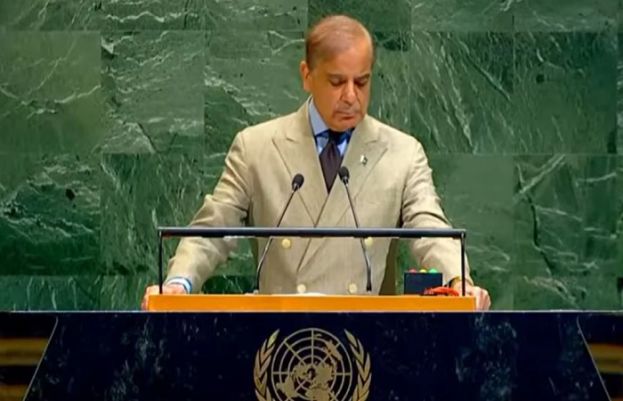the United Nations General Assembly in New York, outlining the country’s stance on key global and regional issues. At the outset of his speech, the prime minister noted that the world is more complex than ever before, conflicts are intensifying, international laws are being brazenly violated, humanitarian crises are multiplying, terrorism remains a potent threat, disinformation and fake trust undermine trust, and climate change threatens are very survival and more so countries like Pakistan. “Today, multi lateralism is no longer an option; it is a need of the hour. Pakistan’s foreign policy, guided by Quaid-i-Azam, based on peace, mutual respect, and cooperation. We believe in the peaceful settlement of disputes through dialogue and diplomacy,” he said. “Last year, from this very podium, I had warned that Pakistan would act and act most decisively against any external aggression. Those words of mine prove true. I hoped [they would not]. But then that is destiny. In May this year, my country confronted unresolved aggression from our eastern front. The enemy came shrouded in arrogance; we sent them back in humiliation, delivering a bloody nose.” “India sought to extract political gains from a human tragedy by spurning my sincere offer of an independent international investigation into the Pahalgam incident,” he said. The prime minister added: “Instead, it attacked our cities and targeted our innocent citizens. When our territorial integrity and national security were violated, our response was in accordance with the right of self-defence under Article 51 of the UN Charter.” He hailed Pakistan’s armed forces and the military leadership, saying: “Our valiant armed forces, under the stellar leadership of Field Marshal Asim Munir mounted an operation of stunning professionalism, bravey and acumen. Repelling the enemy’s attack under Air Chief Marshal Zaheer Babar Sidhu, our falcons took flight and etched their answer across the skies, resulting in seven of the Indian jets being turned to scrap and dust.” The prime minister Pakistan had agreed to a ceasefire following a four-day escalation with India in May from a position of strength. He also expressed gratitude to US President Donald Trump and his tams for “their active role” in bringing about the ceasefire. “President Trump’s efforts for peace helped avert a … war in South Asia. Had he not intervened timely and decisively, the consequences of a full-fledged war would have been catastrophic,” PM Shehbaz said. “Therefore, in recognition of President Trump’s wonderful and outstanding contribution to promote peace in our part of the world, Pakistan nominated him for the Nobel Peace Prize. This is the least we could do … I think he truly is a man of peace.” He also thanked Pakistan’s “friends and partners”, including China, Turkiye, Saudi Arabia, Qatar, Azerbaijan, Iran, the United Arab Emirates and the UN secretary general for extending diplomatic support to Pakistan during the escalation in May. “We have won the war, and now we seek to win peace in our part of the world. This is my most sincere serious offer before this august assembly of the world nations. Pakistan stands ready for a composite, comprehensive and result-oriented dialogue with India on all outstanding issues,” he said. PM Shehbaz emphasised that South Asia required “proactive rather than provocative leadership”. The “unilateral and illegal attempt to hold the Indus Waters Treaty in abeyance defies the provisions of the treaty itself, as well as the norms of international law itself,” he said, adding that Pakistan had made it abundantly clear that “we will definitely and ardently defend the … right of our 240m people on these waters”.
Pakistan’s PM Shehbaz Sharif speaks at the 80th UNGA

